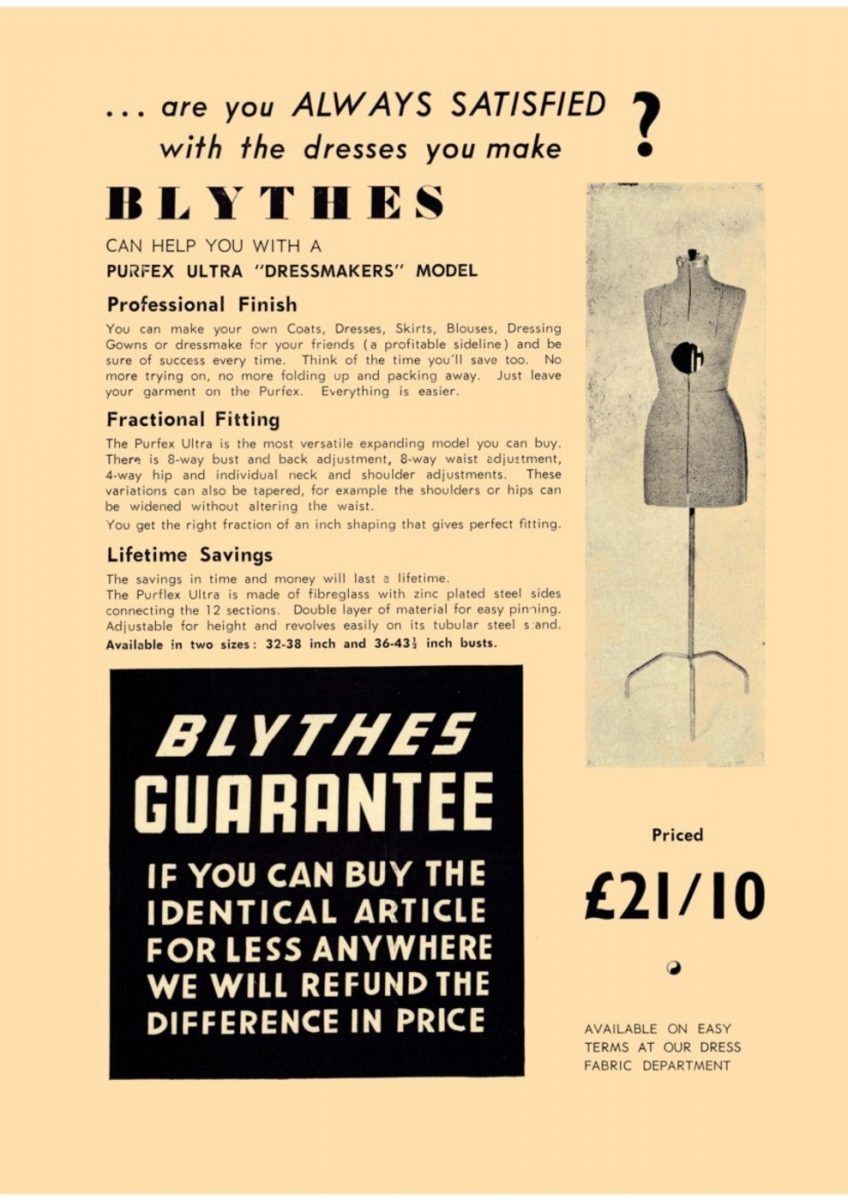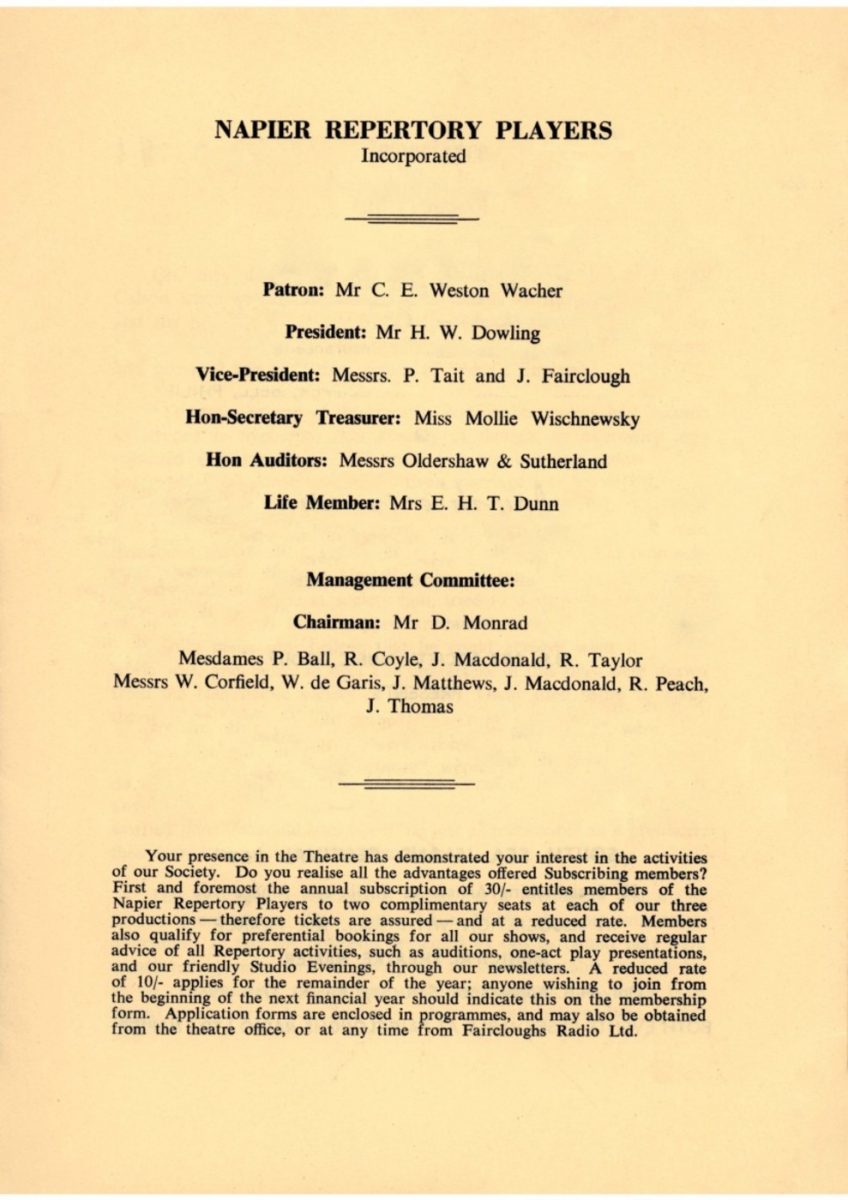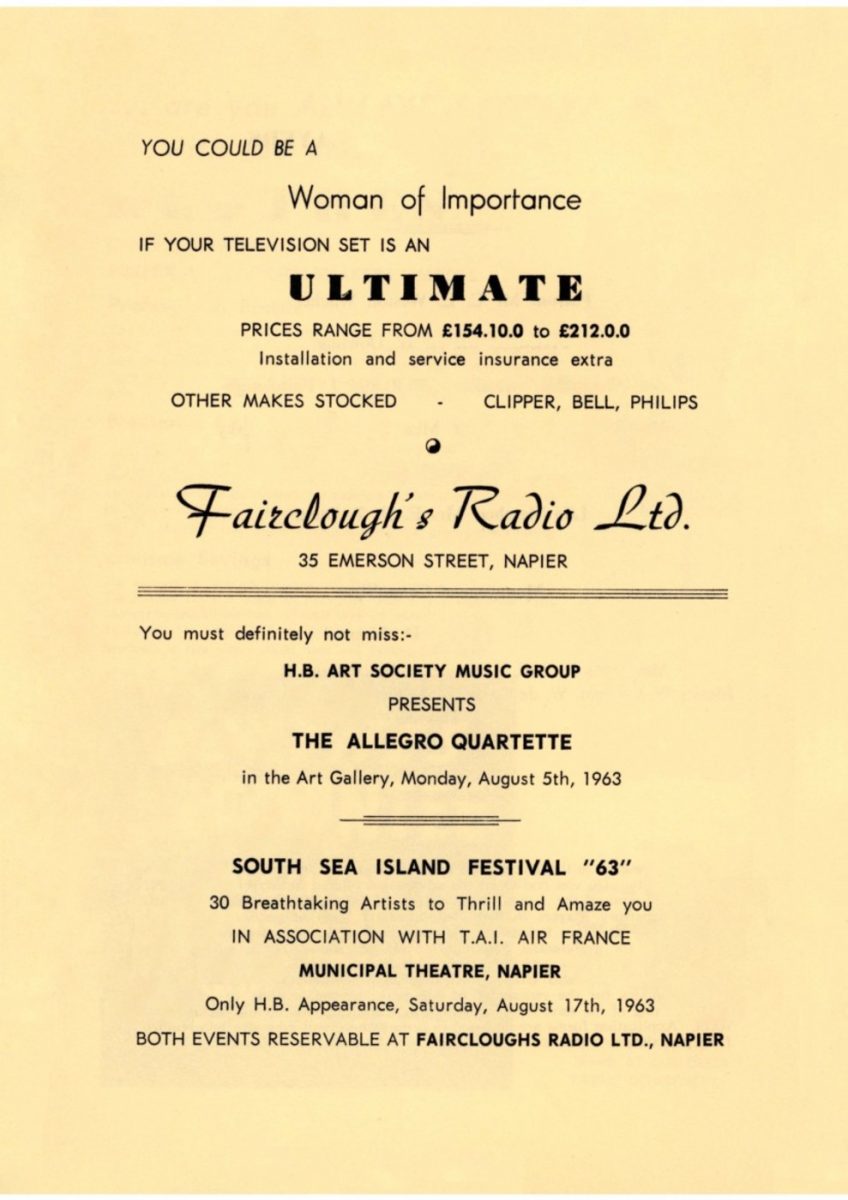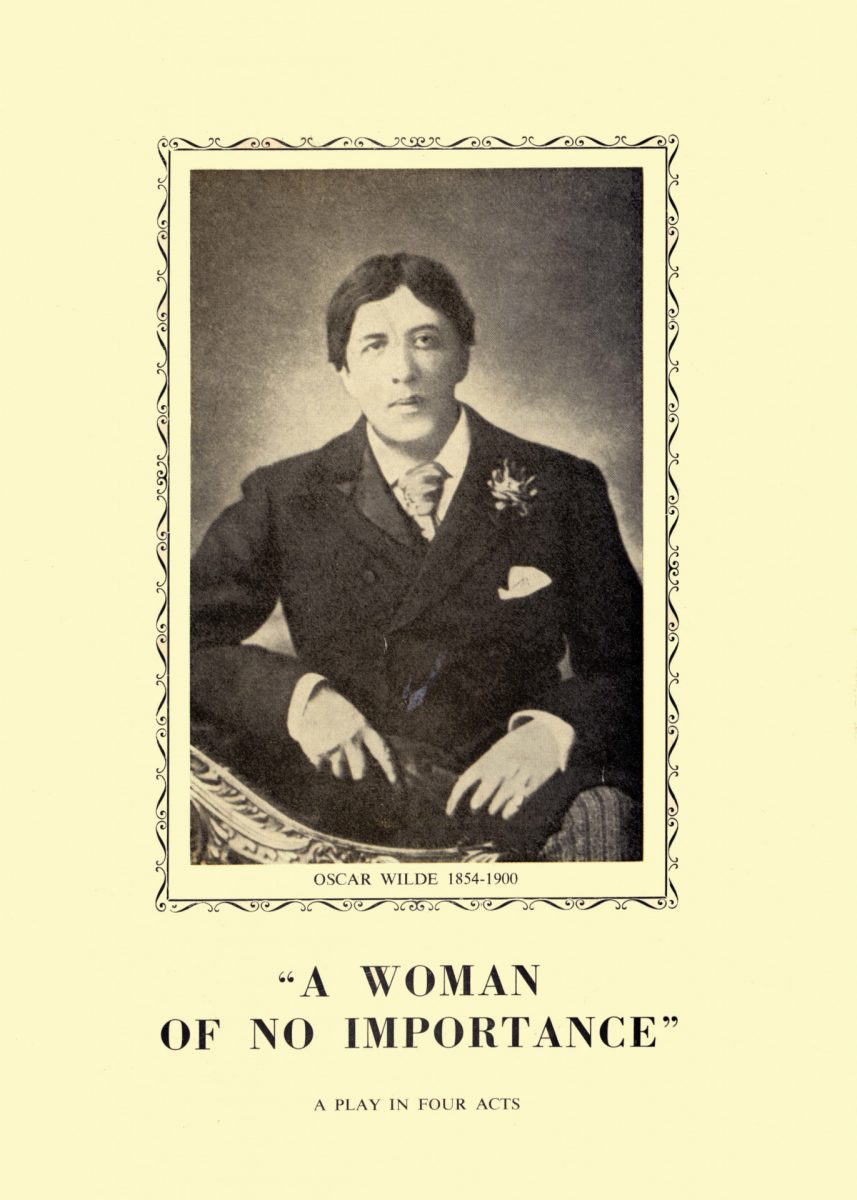- Home
- Collections
- Anonymous 2019
- Programme 1963 - A Woman of No Importance
Programme 1963 – A Woman of No Importance
[Advertisement]
. . . are you ALWAYS SATISFIED
with the dresses you make?
BLYTHES
CAN HELP YOU WITH A
PURFEX “DRESSMAKERS” MODEL
Professional Finish
You can make your own Coats, Dresses, Skirts, Blouses, Dressing Gowns or dressmake for your friends (a profitable sideline) and be sure of success every time. Think of the time you’ll save too. No more trying on, no more folding up and packing away. Just leave your garment on the Purfex. Everything is easier.
Fractional Fitting
The Purfex Ultra is the most versatile expanding model you can buy. There is 8-way bust and back adjustment, 8-way waist adjustment, 4-way hip and individual neck and shoulder adjustments. These variations can also be tapered, for example the shoulders or hips can be widened without altering the waist.
You get the right fraction of an inch shaping that gives perfect fitting.
Lifetime Savings
The savings in time and money will last a lifetime.
The Purflex Ultra is made of fibreglass with zinc plated steel sides connecting the 12 sections. Double layer of material for easy pinning. Adjustable for height and revolves easily on its tubular steel stand.
Available in two sizes: 32-38 inch and 36-43½ inch busts.
BLYTHES
GUARANTEE
IF YOU CAN BUY THE IDENTICAL ARTICLE FOR LESS ANYWHERE WE WILL REFUND THE DIFFERENCE IN PRICE
Priced
£21/10
AVAILABLE ON EASY
TERMS AT OUR DRESS
FABRIC DEPARTMENT

NAPIER REPERTORY PLAYERS
Incorporated
Patron: Mr C. E. Weston Wacher
President: Mr H. W. Dowling
Vice-President: Messrs. P. Tait and J. Fairclough
Hon-Secretary Treasurer: Miss Mollie Wischnewsky
Hon Auditors: Messrs Oldershaw & Sutherland
Life Member: Mrs E. H. T. Dunn
Management Committee:
Chairman: Mr D. Monrad
Mesdames P. Ball, R. Coyle, J. Macdonald, R. Taylor
Messrs W. Corfield, W. de Garis, J. Matthews, J. Macdonald, R. Peach, J. Thomas
Your presence in the Theatre has demonstrated your interest in the activities of our Society. Do you realise all the advantages offered Subscribing members? First and foremost the annual subscription of 30/- entitles members of the Napier Repertory Players to two complimentary seats at each of our three productions – therefore tickets are assured – and at a reduced rate. Members also qualify for preferential bookings for all our shows and receive regular advice of all our Repertory activities, such as auditions, one-act play presentations, and our friendly Studio Evenings, through our newsletters. A reduced rate of 10/- applies for the remainder of the year; anyone wishing to join from the beginning of the next financial year should indicate this on the membership form. Application forms are enclosed in programmes, and may also be obtained from the theatre office, or at any time from Fairclough Radio Ltd.

[Advertisement]
YOU COULD BE A
Woman of Importance
IF YOUR TELEVISION SET IS AN
ULTIMATE
PRICES RANGE FROM £154.10.0 to £212.0.0
Installation and service insurance extra
OTHER MAKES STOCKED – CLIPPER, BELL, PHILIPS
Fairclough’s Radio Ltd.
35 EMERSON STREET, NAPIER
You must definitely not miss:-
H.B. ART SOCIETY MUSIC GROUP
PRESENTS
THE ALLEGRO QUARTETTE
In the Art Gallery, Monday, August 5th, 1963
SOUTH SEA ISLAND FESTIVAL “63”
30 Breathtaking Artists to Thrill and Amaze you
IN ASSOCIATION WITH T.A.I. AIR FRANCE
MUNICIPAL THEATRE, NAPIER
Only H.B. Appearance, Saturday, August 17th, 1963
BOTH EVENTS RESERVABLE AT FAIRCLOUGHS RADIO LTD., NAPIER

A Woman of DEFINITE Importance
. . . the Producer
Oh, they don’t want to read about me . . . ”, denied Miss Calson, when we requested biographical details for this programme . . . and she neatly steered the conversation on to a discussion of Oscar Wilde’s life and times. She explained that a repertory researcher had provided her with this picture of Wilde’s England.
“Towards the end of the century, fashionable society had become so steeped in hypocrisy, that honesty of thought or expression was regarded with suspicion. The truth was not welcome unless it was compatible with mental comfort. Even marriage was heavily coloured with dissembling. Comradeship between husband and wife did not exist, because neither party dared relax and be natural. A man demanded that the woman he chose for his wife be beyond reproach, and he in turn presented himself to her as the essence of godliness. Wilde from his throne as society lion, tried to destroy the thick crust of hypocrisy which was wrapped around the Victorian way of life. His vanity made him believe that he could achieve what it took a world war, and more, to do. The characters in this play were drawn from the fashionable society of the day. Oscar used satire to make them a little larger than life, but there is no misrepresentation.”
You will probably remember Ursula Calson’s performance as the domineering mother in “The House of Bernarda Alba” last year. If any members of the cast of “A Woman of No Importance” were worried that she would turn out to be just as formidable as a producer, their fears were soon proven groundless.
This play was a courageous choice for a producer’s first major theatre presentation. The staging of a Wilde play presents many difficulties. In fact the problems presented by this particular play were considered by most amateur groups to be insurmountable, and as far as we can ascertain “A Woman of No Importance” has never been staged previously in New Zealand – this is a national premiere, if you like!

The Importance of Being . . . Oscar
OSCAR FINGALL O’FLAHERTIE WILLS WILDE, whose very name symbolises his outrageous ostentatiousness, was probably the chief English literary force in the early 1890’s. Certainly he was the most successful, most popular producer of comedies – comedies which have lost none of their slighting biting wit even today. True he did write in recognition of failings in his own society, but his chief appeal has always lain in his ability to extract laugh after laugh with an assured sophistication of wit, seldom seen in the stage today.
His first dramatic success, “Lady Windermere’s Fan”, was a brilliant social comedy, written while on holiday (as were all his plays) in the late summer of 1891. As was to be his habit he named his leading lady after the district in which he stayed; Lake Windermere. None of his plays took more than 3 or 4 weeks of actual work, and as each was partly a glossary of his own clever conversation, it presented no difficulty to him to fling in the finishing touches of wit that made him the biggest box-office draw of his period.
“A Woman of No Importance” repeated his previous success. The first act was written in reply to the critics’ complaints that the early action of “Lady Windermere’s Fan” lacked speed. Thunderous applause greeted the final curtain if this production – cries of “Author” came from all over the house, until a large man who was sitting in a box in full view of the audience rose to his feet and announced: “Ladies and Gentlemen, I regret to inform you that Mr Oscar Wilde is not in the house.” As the speaker was Mr Oscar Wilde himself, he was in a position to know.
“An Ideal Husband” and “The Importance of Being Earnest”, both highly successful comedies, followed, and established for him a reputation as a dandy and wit that has yet to be paralleled. His detractors charged him with plagiarism (which he did not deny) a charge amply illustrated by Whistler, who, having made an amusing remark to which Oscar Wilde said, “I wish I had said that,” replied, “You will, Oscar, you will”.
Oscar Wilde’s entire career was ruined when he foolishly brought a libel charge against the most unpleasant Marquess of Queensberry. He lost his case, was immediately arrested on a morals charge, tried and sentenced to two years penal servitude. He continued to write, and after his release published an expose of H. M. Prisons, signed C33 (his convict number). He lived his last years abroad, and died in Paris at 46, penniless but penitent.
Many scholars debate whether Wilde was a major literary influence; but whatever he may have been, his wonderful, witty plays will not easily be forgotten – nor will his flamboyant, foppish self.

NAPIER MUNICIPAL THEATRE 20th, 22nd and 23rd, JULY, 1963
“A Woman of No Importance”
by OSCAR WILDE
THE CAST in order of appearance
LADY CAROLINE PONTEFRACT RUTH CALSON
SIR JOHN PONTEFRACT HAROLD REES
HESTER WORSLEY MARIANA MAGDALINOS
LADY HUNSTANTON PATRICIA CUMMINS
FRANCIS THE FOOTMAN TONY YATES
GERALD ARBUTHNOT JOE CORRY
LADY STUTFIELD PRISCILLA BALL
MRS ALLONBY IVY WINTERBOTTOM
LORD ILLINGWORTH DON ANDERSEN
Mr KELVIL, M.P. RICHARD HEATH
LORD ALFRED RUFFORD NEVILLE BAKER
GUNSON KEVIN BADDELEY
MRS ARBUTHNOT JACQUE THOMAS
THE VEN. JAMES DAUBENY, D.D. TREVOR CARDO
FARQUHAR THE BUTLER BILL de GARIS
ALICE THE MAID DELIA CARLYON
Produced by URSULA CALSON
for the Napier Repertory Players
THE SCENE
ACT I
The Terrace at Hunstanton Chase
ACT II
The Drawing-room at Hunstanton Chase
ACT III
The Hall at Hunstanton Chase
ACT IV
The Sitting-room in Mrs Arbuthnot’s House at Wrockley
THE TIME: 1893 THE PLACE: The Shires
The action of the play takes place within 24 hours
[Advertisement]
TO THE WOMAN OF IMPORTANCE: We suggest that you visit our store soon, where you will find the best in both modern and traditional furniture – where Quality costs no more
THE REES FURNISHING CO. (H.B.) LTD. DICKENS ST. NAPIER

PRODUCTION PERSONNEL
STAGE MANAGEMENT BILL de GARIS, GRAHAME MURRAY, DOUG. HARDGRAVE
PROMPT GILLIAN DAVIES
PROPERTIES BERENICE O’BRIEN and assistants
MAKE UP FRANCES READE and assistants
COSTUMES URSULA and RUTH CALSON
WARDROBE ASSISTANTS LINDA KING, JO WHITE MOIRA CROZIER, GLORIA WARE ROSALIE SPENCE
SET REALISATION AND LIGHTING GWYN ACE
SET CONSTRUCTION Members of the Society
ADDITIONAL CONSTRUCTION TIM McCARTHY
LIASON OFFICER JOHN C. THOMAS
PHOTOGRAPHY PHIL MOORE
PROGRAMME and PUBLICITY BILL CORFIELD, JANICE MACDONALD, JOHN MATTHEWS JOHN MACDONALD
HOUSE MANAGEMENT JOHN FAIRCLOUGH
Also a special credit to those who have the rather unrewarding task of understudying and appearing briefly – Gillian Davies, Delia Carlyon, Tony Yates, Neville Baker, Judy Blathwayt.
We wish to record our gratitude to all those whose, interest, generous help and untiring efforts have made this production possible, particularly:
The New Zealand Drama Council for the assistance given our Society in arranging for the visit to Napier of Mr Raymond Boyce, one of New Zealand’s foremost stage designers, to advise on set design. His contribution to the staging of this production will undoubtedly add to the pleasure of your evening with Oscar Wilde, and we join you in thanking Raymond personally.
Olive and Reg Kilbey for their much appreciated assistance given this Society in the past and in connection with the present production. We are deeply indebted to these good people of “RAPHAEL STUDIOS”.
The New Zealand Opera Company for the loan of drapes.
King Charles Spaniel by courtesy of Elizabeth Turner.
Martin Printing Co. Ltd., Blythes Ltd., Daily Telegraph, Herald-Tribune.

The Cast takes a bow . . .
What a wealth of experience DON ANDERSEN brings to this production: Twenty years in repertory throughout New Zealand; professional radio work in N.Z.B.C. drama productions; Shakespearian drama in New Zealand, Australia and England.
Auckland’s loss has indeed been Napier’s gain. JACQUE THOMAS is still remembered for her performances for Auckland Repertory and the Community Players. Napier audiences will remember her appearances in “Bonaventure” and “The Shifting Heart”.
Writing for the stage is a further string to the theatrical bow of IVY WINTERBOTTOM who comes to Napier Repertory with many years experience in acting and producing for Whakatane Repertory. Ivy has also been associated with the theatre overseas.
Matters musical feature prominently in RUTH CALSON’S background. She’s been in Light Operettas and appeared with the N.Z. Opera Company. Ruth was seen most recently in “House of Bernarda Alba” and “House by the Lake”.
The voice of PATRICIA CUMMINS is well known to radio listeners in Hawke’s Bay. Patricia produced “Sweeney Todd” (the demon barber) Napier’s first glimpse of “Olde Time Theatre” for many years.
Cast your mind back over the widely differing roles played by PRISCILLA BALL in “Hotel Paradiso”, “Both Ends Meet”, “A Phoenix Too Frequent”, and “Sweeney Todd” and you’ll realise just how versatile an actress Priscilla is.
Well known to Napier audiences as an actor of considerable experience, and producer of many successful major productions … ladies and gentlemen it is with pleasure we announce the return to the boards of Mr HAROLD REES.
Either before or behind the backdrop, as an actor, or acting in a backstage capacity … there’s hardly a repertory production which does not call upon the talents of TREVOR CARDO.
As the maid in “Hotel Paradiso” MARIANA MAGDALINOS created a very favourable impression in her first Repertory role. Here she gets an opportunity to show what she can do in a “big” part.
Did you realise that NEVILLE BAKER was making his first-ever appearance behind the footlights when he took the principle [principal] role as the psychiatrist in “The House by the Lake”?
A dual role is played by Bill de Garis. Bill takes an active part both on stage and behind scenes.
Where would we be without our younger, up and coming performers? It is pleasing to see newcomers JOE CORRY, TONY YATES, RICHARD HEATH and DELIA CARLYON taking such an interest in repertory work.

In striking contrast to the present production, Napier Repertory Players proudly announce that their third major play presentation of 1963 will be Arthur Miller’s powerful:
“THE CRUCIBLE”
This tense drama by the noted author of “Death of a Salesman” has created immense interest wherever it has been performed. If you are interested in being associated with the production in any capacity, note now the audition date: August 15th.
John C. Thomas will produce “The Crucible” for the Napier Players. Since his arrival from Auckland, where he had already established an enviable reputation as an actor and producer, John has appeared as a principle in “Bonaventure”, and has not only produced, but also taken the leading role in last year’s exceedingly successful presentation of “Hotel Paradiso”.
You will see “The Crucible in the comfortable surroundings of Repertory’s newly renovated Little Theatre in McGrath Street. The floor of the auditorium has been raked in steps from the front to the rear of the Theatre, so that every seat offers an uninterrupted view of the stage, and in addition, the Theatre is decorated to a plan prepared by Raymond Boyce.
[Advertisement]
LADIES: are you wanting a special Hair Style for that special occasion
If so consult the
Jill Doré
Beauty Salon
FOR
MODERN HAIRSTYLING
FIRST CLASS PERMING
THE VERY LATEST COLOUR TECHNIQUES
SKILLED HAIR CUTTING
Phone 5241 or call at the Jill Dore Beauty Salon for your appointment and enjoy the first class work created for you in Napier’s latest modern Hair Salon.

[Advertisement]
Travel by NEWMANS Coach Lines
5 SERVICES DAILY
TO PALMERSTON NORTH AND WELLINGTON
CHARTER COACHES
Our 36 Seater Luxury Coaches (shown above) are available at most reasonable rates for contract work
Entertainment
Race Meetings
We regularly run special trips to overseas theatrical companies, etc., that are not visiting Hawke’s Bay.
We arrange theatre seats, meals.
SPECIAL TRIPS ARE MADE TO MOST RACE MEETINGS
For further information
– contact –
NEWMAN BROS. (North Island) LTD.
MUNRO STREET (near Clive Square) PHONE 5872
Printed by Martin Printing Co. Ltd., Napier

Non-commercial use

This work is licensed under a Attribution-NonCommercial 3.0 New Zealand (CC BY-NC 3.0 NZ).
Commercial Use
Please contact us for information about using this material commercially.Can you help?
The Hawke's Bay Knowledge Bank relies on donations to make this material available. Please consider making a donation towards preserving our local history.
Visit our donations page for more information.
Description
[List of names in this title still to be added – HBKB]















Do you know something about this record?
Please note we cannot verify the accuracy of any information posted by the community.